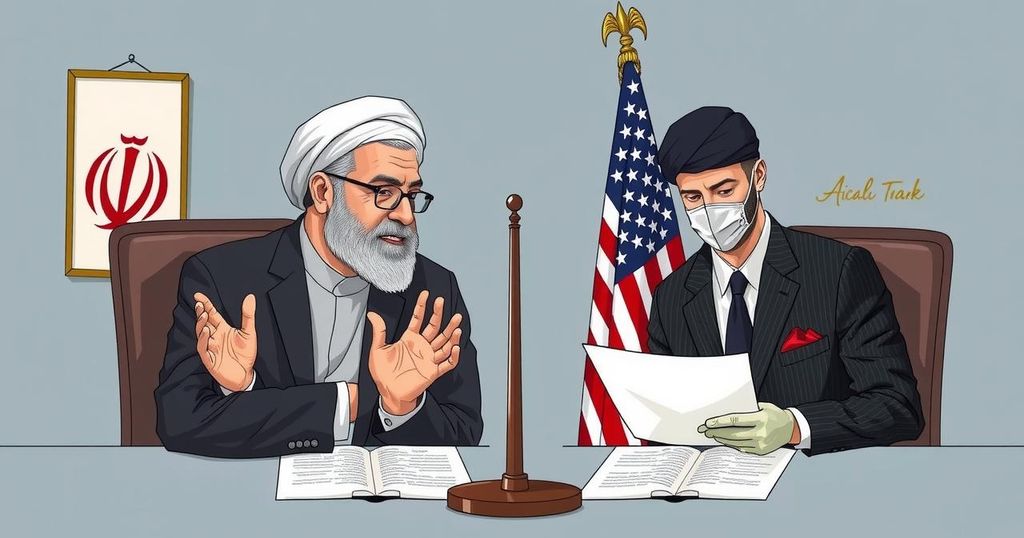Celebrity
ABBAS ARAGHCHI, ARAGHCHI, ASIA, DONALD TRUMP, ECONOMIC SANCTIONS, EUROPE, EUROPE/ASIA, EUROPEAN UNION, FOREIGN POLICY, FRANCE, INTERNATIONAL RELATIONS, IRAN, IRIB, JCPOA, JOE BIDEN, MINISTRY OF FOREIGN AFFAIRS, MORA, NUCLEAR POLICY, RUSSIA, SANCTIONS, TV, UN SECURITY COUNCIL, US, US-IRAN RELATIONS
David O'Sullivan
0 Comments
Iran Sets Preconditions for Nuclear Negotiations with the United States
Iran’s Foreign Minister Abbas Araghchi stated no nuclear talks with the U.S. will occur unless the U.S. returns to the JCPOA. Iran is currently negotiating with European countries and has emphasized its commitment to peaceful nuclear aims. The JCPOA negotiations have been stalled primarily due to the U.S.’s refusal to fully lift sanctions.
In a recent announcement, Iranian Foreign Minister Abbas Araghchi emphasized that discussions regarding the nuclear agreement with the United States will not proceed unless the U.S. re-enters the Joint Comprehensive Plan of Action (JCPOA). Araghchi stated, “We will not negotiate with the US government on the nuclear issue until they return to the JCPOA,” indicating a clear stance that Iran expects the U.S. to demonstrate a commitment to the agreement. While U.S. negotiations remain on hold, Iran is actively engaging with European nations as well as China and Russia to find pathways for nuclear discussions.
Araghchi further detailed that Iran has consistently remained open to negotiations, remarking, “We have never left the negotiating table on the nuclear issue… because we are sure of the peaceful nature of our nuclear program.” The ongoing negotiations with the UK, France, and Germany are focused on restarting the dialogue necessary to revive the JCPOA, which was originally established in 2015. These talks have been ongoing since April 2021, aimed at ensuring that the U.S. commits to lifting sanctions imposed by the previous administration.
The JCPOA negotiations have faced challenges, primarily due to the U.S.’s reluctance to fully lift sanctions and provide guarantees regarding its commitment to any future deal. The stalemate has persisted since August, as Iran seeks assurances of U.S. compliance before proceeding with further negotiations.
The Joint Comprehensive Plan of Action (JCPOA), signed in 2015, was a landmark agreement created to limit Iran’s nuclear program in exchange for easing economic sanctions. The U.S., under President Donald Trump, withdrew from the agreement in 2018, reinstating sanctions that significantly impacted Iran’s economy. Since President Joe Biden signaled a potential return to the JCPOA, diplomatic efforts involving Iran and the five permanent members of the UN Security Council—along with Germany—have been ongoing to revive the deal. The negotiations, however, have faced difficulties, largely tied to the U.S.’s insistence on maintaining some sanctions and Iran’s demand for guarantees of commitment to any agreements.
Iran’s position on nuclear negotiations reflects a firm stance that any discussions with the U.S. depend on the latter’s restoration of the JCPOA. The ongoing negotiations with European nations and key allies indicate Iran’s commitment to finding a resolution amid a challenging diplomatic landscape. As the situation evolves, the focus remains on achieving an agreement that respects Iran’s interests while addressing international concerns over its nuclear program.
Original Source: en.mehrnews.com




Post Comment